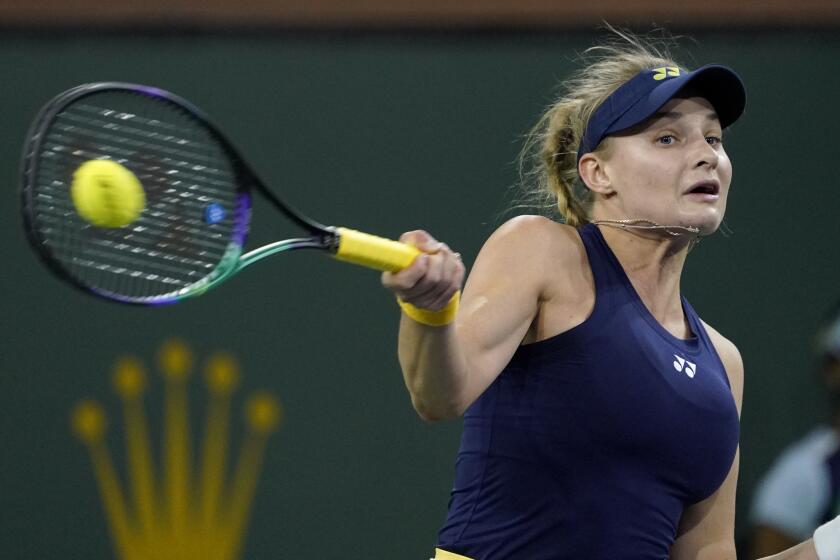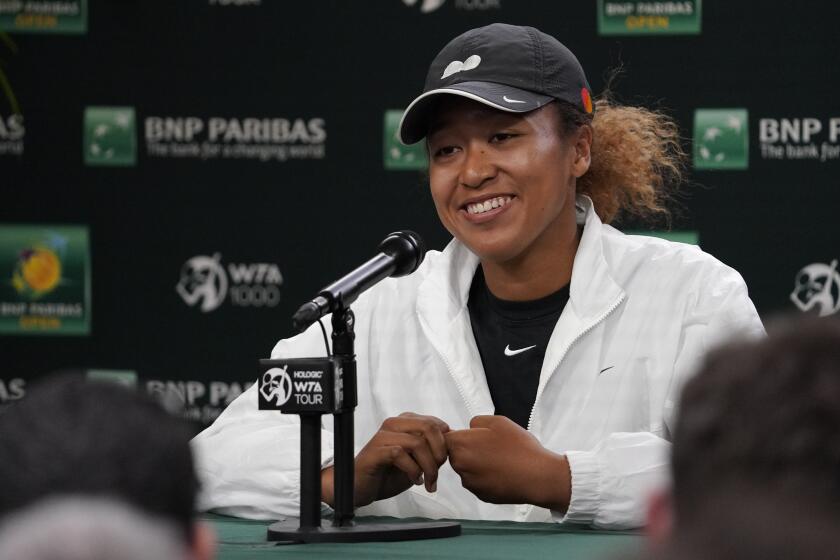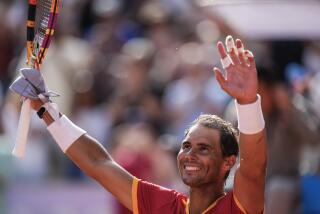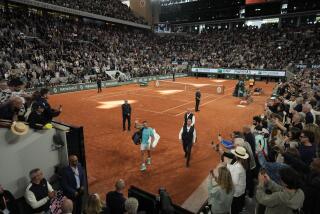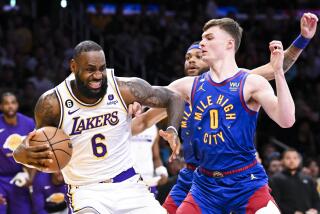Column: Rafael Nadal grateful for return to tennis after harrowing injury break
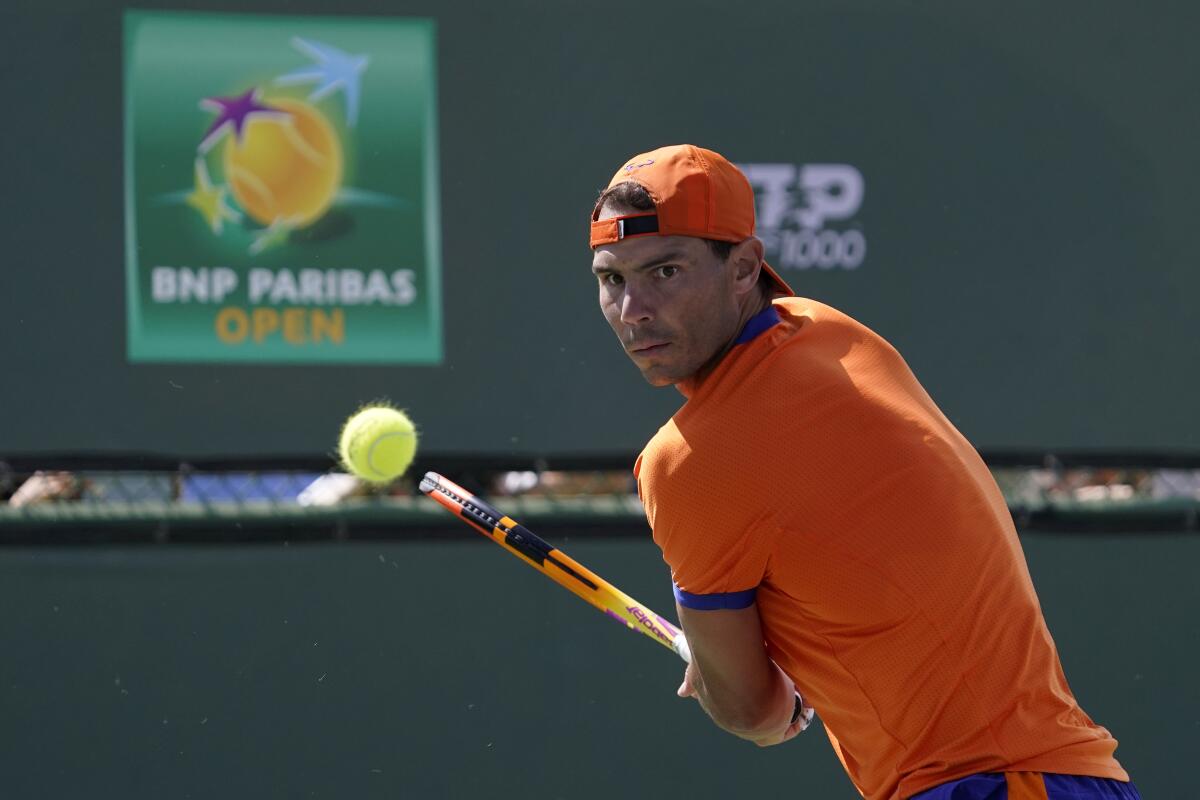
INDIAN WELLS — Six months ago Rafael Nadal was dependent on crutches, his left leg unable to bear weight because of a flare-up of the foot problems that have plagued him throughout his glorious career. He has been held together by tape and hope for many years, but time seemed to be running out on him as he passed 35.
He had to abbreviate his schedule in 2021, missing Wimbledon, the delayed Tokyo Olympics and the U.S. Open. He shut down his season in August. He couldn’t practice consistently or well. Pain became his constant companion.
“After Roland Garros I couldn’t almost walk for two weeks,” he said of his semifinal loss to Novak Djokovic at the French Open, the tournament he has won a record 13 times. “I remember not having the chance to go down the stairs normal at all.”
His woes continued as he began to ramp up his activity. On Dec. 20 he announced he had tested positive for COVID-19 after he returned home to Spain from an exhibition in Abu Dhabi. “I am experiencing some unpleasant moments,” he said via social media.
Fast forward to January of this year, when a revived Nadal rallied from two sets down to defeat then-25-year-old Daniil Medvedev to win the Australian Open and take the lead in men’s career Grand Slam singles titles with 21, one more than Djokovic and Roger Federer.
There were no miracles involved in Nadal’s return to peak form, just the smarts and the gritty efforts that have made him effective on every surface and place him among the sport’s all-time best. “There’s no words. What he did, I mean, it’s crazy. I don’t know if he’s one of the best athletes in the history,” said Paula Badosa, a fellow Spaniard who is seventh in the women’s world rankings.
Competing at the BNP Paribas Open, Ukrainian tennis player Dayana Yastremska doesn’t know when she’ll go home or when she’ll be reunited with her family.
“It’s insane. Not even what he did. He was two sets down, and not against 70 in the world. No, it’s Medvedev, so it’s even crazier. He’s an inspiration for I think all the athletes but not even [only] the athletes. He’s amazing and of course he’s my idol, so what can I say?”
Nadal cried after his Australian Open triumph, unashamed to let the world see his deep appreciation for a moment he wasn’t sure he’d ever experience again.
“The fact that I was able to see myself competitive and enjoying the competition, that’s what was very emotional for me, to be able to play in this huge stadium in front of plenty of people, something that I missed a lot too. All the situations have been very emotional for me,” he said this week.
It’s remarkable that he won. It’s equally remarkable that he has sustained that momentum.
Nadal brought a 15-0 record this season to the BNP Paribas Open, where he’s the No. 4 seed. After a first-round bye he will begin play on Saturday against up-and-coming American Sebastian Korda. Here’s some perspective on the scope of Nadal’s excellence: Korda was a month from his fifth birthday when Nadal won the first of his French Open titles in 2005.
To Nadal, his superb start isn’t merely a statistic. It’s affirmation of his enduring will, the quality that most endears him to tennis experts and casual fans.
“For me what it means is happiness, surprise and thankful for this opportunity again,” he said during a news conference before the tournament. “And thankful to the team and the family for the support and for helping me in the very low moments. I go day by day planning to enjoy, simply.
“The moment is an unexpected moment for me to be in this position, so I am enjoying every day and trying to stay with the right tactics to try to keep enjoying the fact that I am playing well and I am winning matches.”
Naomi Osaka enters the BNP Paribas Open with confidence she can enjoy tennis again after sharing her mental health struggles last year.
He’s succeeding because he’s listening more closely than ever to his body. “I have been able to find always a way to adapt my game to what I really need to be competitive every day,” he said. “Some days playing more aggressive, some days playing with a little bit more tactically. Sometimes more defensive. My serve has been working well since the beginning of the year. That is important at this stage of my career, without a doubt.
“And then I have been, I think, brave enough to play with the right determination at the moment that I need it. In general terms, I have been playing more or less well from all the parts of my game that I want. I am just working to try to keep improving things, but in general terms I can be happy about the level of tennis and the level of intensity and tactics.”
His foot problem remains a constant concern. “The foot is not going to be 100% recovered, never,” he said. “Pain, I have dire pain on the foot.” That’s the key reason he’s reluctant to make long-term plans.
“For the moment I can be happy about things. But at some point I’m going to need to do a little more treatment, maybe stop for a little while,” he said. “I have to find the right balance between competing and finding the moments to stop and to do the things to try to play as long as possible. If I am able to plan the right way my calendar and follow my calendar, I really can’t ask for anything more.
“That’s my goal. I am here. I am super happy to be in Indian Wells now, and then I don’t know what’s going to happen, but I am just enjoying every single day here, and that’s it.”
More to Read
Go beyond the scoreboard
Get the latest on L.A.'s teams in the daily Sports Report newsletter.
You may occasionally receive promotional content from the Los Angeles Times.

